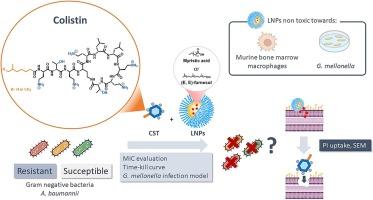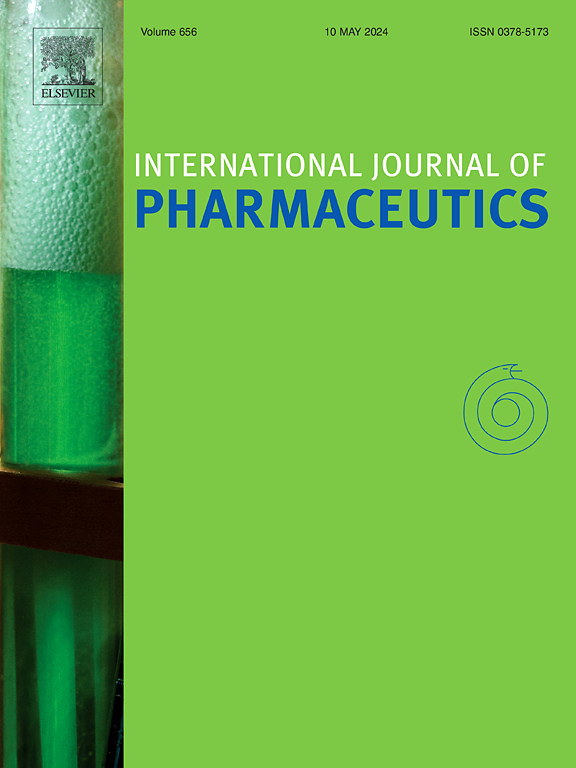(E, E)-farnesol and myristic acid-loaded lipid nanoparticles overcome colistin resistance in Acinetobacter baumannii
IF 5.2
2区 医学
Q1 PHARMACOLOGY & PHARMACY
引用次数: 0
Abstract
The rise of colistin-resistant Acinetobacter baumannii has severely limited treatment options for infections caused by this pathogen. While terpene alcohols and fatty acids have shown potential to enhance colistin’s efficacy, but their high lipophilicity limits their clinical application. To address this, we developed water-dispersible lipid nanoparticles (LNPs) in two sizes (40 nm and 130 nm), loaded with these compounds to act as colistin adjuvants. Among eleven LNP formulations, six significantly reduced colistin’s minimum inhibitory concentration (MIC) by 16- to 64-fold. The most effective, featuring (E,E)-farnesol and myristic acid, were further examined for bactericidal activity, membrane disruption, cytotoxicity, and in vivo efficacy in Galleria mellonella larvae. Time-kill studies demonstrated that at an adjuvant concentration of 60 mg/L, these LNPs eradicated bacteria when combined with 4 mg/L free colistin for resistant isolates (MIC = 128 mg/L) and 0.06 mg/L for susceptible isolates (MIC = 0.5 mg/L), without regrowth. Myristic acid-loaded LNPs combined with free colistin at 1/8 MIC resulted in a 4.2-fold higher mortality rate than the combination with (E,E)-farnesol-loaded LNPs in resistant strains. This result was correlated with a 45-fold faster increase in inner membrane permeability, measured by propidium iodide (PI) uptake, in the presence of myristic acid-loaded LNPs compared with a 13-fold faster increase with (E,E)-farnesol-loaded LNPs. DiSC3(5) assays revealed that LNPs alone depolarised the bacterial inner membrane, with enhanced effects when combined with colistin at 1/8 MIC, a result not observed with colistin alone at this concentration. As with PI uptake, this inner membrane depolarising effect was more pronounced with myristic acid-loaded LNPs than with (E,E)-farnesol-loaded LNPs in resistant strains, suggesting that the colistin adjuvant effect of these lipophilic compounds is due to their ability to help colistin destabilise the bacterial inner membrane. Cytotoxicity assays demonstrated no adverse effects on bone marrow macrophages after 6 h of exposure, although some toxicity was observed after 24 h. No mortality was observed in Galleria mellonella larvae over 7 days following three consecutive days of treatment with colistin and LNPs. Notably, the combination of (E,E)-farnesol-loaded LNPs and colistin significantly improved the survival of Galleria infected with A. baumannii. These results suggest that lipophilic-adjuvant-loaded LNPs may offer a promising strategy to enhance colistin efficacy and combat antibiotic-resistant A. baumannii infections.

(E,E)-法尼醇和肉豆蔻酸负载脂质纳米颗粒克服了鲍曼不动杆菌对可乐定的耐药性。
耐秋水仙碱鲍曼不动杆菌的增加严重限制了治疗由这种病原体引起的感染的选择。虽然萜烯醇和脂肪酸具有增强秋水仙碱药效的潜力,但它们的高亲脂性限制了其临床应用。为了解决这个问题,我们开发了两种尺寸(40 纳米和 130 纳米)的水分散脂质纳米粒子(LNPs),并在其中添加了这些化合物作为可乐定佐剂。在 11 种 LNP 制剂中,有 6 种能将秋水仙素的最低抑菌浓度(MIC)显著降低 16 到 64 倍。对其中最有效的配方((E,E)-法呢醇和肉豆蔻酸)的杀菌活性、膜破坏性、细胞毒性和对腺瘿蚊幼虫的体内药效进行了进一步研究。时间杀灭研究表明,在 60 毫克/升的佐剂浓度下,这些 LNPs 与 4 毫克/升的游离可乐定(MIC = 128 毫克/升)和 0.06 毫克/升的游离可乐定(MIC = 0.5 毫克/升)结合使用时,可消灭耐药分离菌(MIC = 128 毫克/升)和易感分离菌(MIC = 0.5 毫克/升),且不会再生长。在耐药菌株中,肉豆蔻酸负载的 LNPs 与 MIC 值为 1/8 的游离可乐定结合使用,死亡率比与 (E,E)-farnesol 负载的 LNPs 结合使用高出 4.2 倍。这一结果与肉豆蔻酸负载型 LNPs 存在时内膜通透性(通过碘化丙啶(PI)摄取量测量)的增加速度比(E,E)-法呢醇负载型 LNPs 的增加速度快 45 倍有关,而肉豆蔻酸负载型 LNPs 的增加速度比(E,E)-法呢醇负载型 LNPs 的增加速度快 13 倍。DiSC3(5)测定显示,单独使用 LNPs 会使细菌内膜去极化,当与 MIC 值为 1/8 的可乐定结合使用时,效果会增强,而在此浓度下单独使用可乐定则不会出现这种结果。与 PI 吸收一样,在耐药菌株中,肉豆蔻酸负载型 LNPs 比(E,E)-法呢醇负载型 LNPs 的内膜去极化效果更明显,这表明这些亲脂化合物的可乐定辅助作用是由于它们能够帮助可乐定破坏细菌内膜的稳定性。细胞毒性试验表明,接触 6 小时后对骨髓巨噬细胞无不良影响,但 24 小时后观察到一些毒性。连续三天使用可乐定和 LNPs 处理 Galleria mellonella 幼虫后,7 天内未观察到幼虫死亡。值得注意的是,(E,E)-法尼醇负载的 LNPs 和秋水仙素的组合能显著提高感染鲍曼不动杆菌的水蚤的存活率。这些结果表明,亲脂性添加剂负载的LNPs可能是提高秋水仙素疗效和抗击耐抗生素鲍曼尼氏菌感染的一种有前途的策略。
本文章由计算机程序翻译,如有差异,请以英文原文为准。
求助全文
约1分钟内获得全文
求助全文
来源期刊
CiteScore
10.70
自引率
8.60%
发文量
951
审稿时长
72 days
期刊介绍:
The International Journal of Pharmaceutics is the third most cited journal in the "Pharmacy & Pharmacology" category out of 366 journals, being the true home for pharmaceutical scientists concerned with the physical, chemical and biological properties of devices and delivery systems for drugs, vaccines and biologicals, including their design, manufacture and evaluation. This includes evaluation of the properties of drugs, excipients such as surfactants and polymers and novel materials. The journal has special sections on pharmaceutical nanotechnology and personalized medicines, and publishes research papers, reviews, commentaries and letters to the editor as well as special issues.

 求助内容:
求助内容: 应助结果提醒方式:
应助结果提醒方式:


